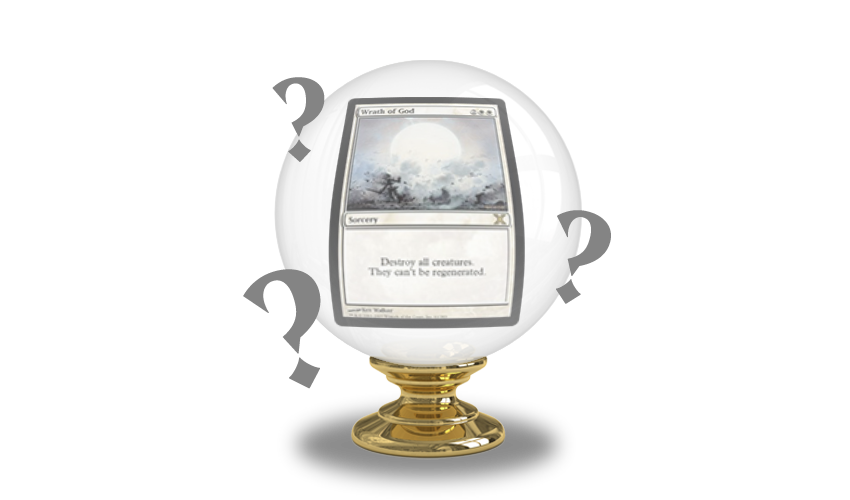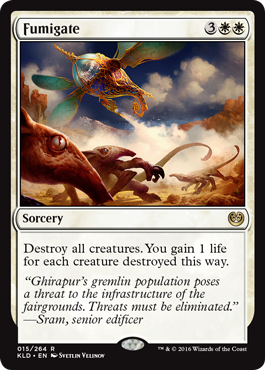Now or Later
In the beginning, there was nothing.
Then, there was this:
Appearing all the way back in Limited Edition (Alpha), Magic's very first set, it took a little bit to catch on, as people weren't sure why destroying all creatures—your own included—could be a good thing. But over time, Wrath of God came to define a lot of early Magic control decks and set the benchmark for board sweepers.
The trick with any board sweeper, whether it's Wrath or something else, is to build your deck and play your game in such a way that you're advantaged.
For example, if your deck only has seven creatures and the rest are control elements, it's going to be pretty easy to make Wrath of God destroy several of your opponent's creatures at no cost to your own. Even if you put it in a midrange deck with creatures, you know it's in your hand and can play to make it good in ways like holding back on casting your creatures. Though Wrath of God may look symmetrical, it seldom is.
That's the core of it—and if you want more on the topic of what kind of decks want ways to clear the board, I highly recommend checking out this article by esteemed pro Reid Duke. My advice in that regard pretty much mirrors his perspective, and I don't feel the need to just retread it here.
Instead I want to go to a different level—to go, perhaps, beyond the basics. Today we're going to zoom in on this very specific question: When is the right time to cast my board sweeper?
When to pull the trigger on your board clear can be the difference between winning and losing a game of Magic. Sure, sometimes your opponent will curve out perfectly, and then you'll play your requisite land drop and slam the sweeper you need to not die. Sometimes your opponent will have a piddly 1/1 plinking away at your 16-point life total and you can feel secure leaving the Wrath in your hand. But in all the instances in between, there's a very important decision to make.
So how do you go about making that decision? Read on! (And yes, there is a Kaladesh preview card around the corner—just hold on a little longer!)
Getting Value and Stopping Problems
There are three main reasons to hold a board sweeper instead of casting it right away.
The first is that you think you can get more value with it later by destroying more/better creatures.
In essence, cards that destroy all creatures are a little like a "push your chances" mini-game. Your goal is to kill off as much stuff that you care about as possible...without waiting so long that it ends up causing you to lose the game.
Sure, you could cast your Wrath if you're at 20 life and your opponent has a 3/3—but why not wait a turn to see if they play something else you get to blow up? Even if they decide not to (potentially because they're scared of your Wrath), that means you bought a turn of them not doing anything.
The second reason is because you want to wait to try and get rid of specific creatures.
For example, it's late in the game and your opponent has two 2/2s...but you also know they have Simic Sky Swallower in their deck.
You may want to consider holding your sweeper to deal with a card like this that could cause you some major headaches. You can probably deal with those 2/2s in another way (or take a couple hits), and you'd rather save your Wrath to prevent you from losing later on.
The third reason is that you simply want to set up to make your post-sweeper turns better, or be more mana efficient.
Imagine you have Assemble the Legion in your hand and five mana.
You could Wrath now, then play Assemble next turn. But if the threat on the board isn't huge, playing Assemble now means it has a turn to get active and start building, plus your opponent might spend their turn playing another creature you get to Wrath away.
If your opponent has 4 power worth of creatures and you sweep now, then they untap and play a 4/4, you're right back in a position similar to if you had cast Assemble first. The difference is that if you play Assemble first, they might also feel the need to extend out further—which will make your Wrath pick up more value and put you in a place where Assemble the Legion is rolling and your opponent has nothing!
Often, like that situation, it's a combination of these factors that makes you want to hold off.
Thinking Ahead
The first thing I try to do when figuring out whether to sweep the board or not is look a turn ahead. If I don't end up casting my Wrath here, what does the game look like?
Imagine you're at 7 life and you're staring down three of these guys:
Let's think about the world where you don't fire off your sweeper here. You'll take 6, and then be sitting at 1 life. You can Wrath next turn and catch their board, plus anything else they play...
...but there's all kinds of problems with that strategy. First and foremost, it puts you to 1 life. That means you have to kill off everything for the rest of the game or risk dying. On top of that, your opponent isn't likely to play more creatures; if they have three creatures and you're at 1, they likely aren't going to needlessly extend further. And, to top it off, you may not even get another turn: they're playing red, so any haste creature or burn spell would finish you off either now or later!
On the flip side, imagine you're at 20 instead. Then you're totally in a spot to, if you want, soak up some damage and try to catch another creature next turn.
Thinking Behind
A lot of the value of waiting is predicated on actually catching another creature. So here's a good question to ask: Could my opponent have cast a creature last turn and didn't?
If your opponent is fearlessly casting creatures, then it's more likely they're going to plop out another one next turn for you to pick up as added value.
On the flip side, if they passed with five mana and four cards in their hand last turn, then either they don't have any creatures or they're wise to the fact you may have a sweeper and want to play it safe. Either way, you can start to remove the idea of getting extra value from the equation and start looking at other reasons why you might want to wait.
Similarly, a situation you'll encounter often is that they have no cards (or one card) in their hand. In this case, it's usually right to go for your sweeper if they have any kind of board presence at all. They have to draw more creatures to get out of it, and otherwise they have nothing.
Think about what has happened and the current situation outside of just what's on the battlefield to help inform your Wrath decision.

Compound Value
If you have a sweeper in Limited, normally it's your only one. But in Constructed formats like Standard, it's probably just one of the three or four copies you're playing—and that means you can draw more!
If you have a backup in your hand, then it's a lot safer to play one a tad early. A classic play pattern is you have two full board clears in your hand, you play one, your opponent thinks the coast is clear and unloads several more creatures, and then you untap and play the other.
Additionally, part of the reason why you would wait on a Wrath is to increase your chances of finding another. Casting a card draw spell early instead of Wrathing a small board helps you dig to your sweepers so you can have them ready to go if necessary—as opposed to Wrathing now, having them play some even bigger threats, and having to take a turn to cast your card draw spell to find a Wrath you can't even guarantee you'll draw.
Changing the Formula
Of course, different sweepers have different abilities, and some of them may encourage you to play one way or another when it comes to Wrathing sooner or later.
And Kaladesh? Well, it has a card that's one of the strongest Wrath variants we've made in recent memory.
Now that you understand some of the different times you might want to Wrath (who am I kidding—most of you probably just scrolled down here as fast as you could looking for the Kaladesh preview card), let's check out Fumigate:

These days, five mana is the baseline for a full sweeper—and what a sweeper this is!
Fumigate is a control player's dream. It's not just a way to way to clear the board and get card advantage, it gives you life back in the process! In addition to all the card advantage clearing the board with one card usually nets you, this one casts a life-gain spell for free!
It also changes the math a bit. As long as you don't die, you can push your chances a little bit. If your opponent's board has some 2/2s and your choice is Fumigate this turn or do something else now and Fumigate next turn, you can wait and know that you'll climb back up. And if your opponent does play more creatures, then you're killing them and gaining life in the process! Or, if you'd rather play it safe, the life you gain by casting it now gives you an added buffer in case your opponent plays something large you need to buy time to remove.
Where Fumigate especially shines is against the 1/1 token armies that show up commonly in Standard. You get to deal with all of their tokens and undo the damage they have done!
We've seen how brutal life gain can be when attached to key control effects in the past, like on Sphinx's Revelation. And Fumigate is a card that will likely be a defining part of Standard for as long as it's around.
Later
And there you have it: sweeper strategies and a new preview card to boot!
In the new Standard format, you're going to want to be more careful about playing out excess creatures than ever. Not only do you throw them away, but your opponent gains life for them! But when to hold your creatures? That sounds like a topic for another article...
Hopefully you enjoyed this blast of strategy! If you have any thoughts or comments, or just want to talk about how you feel about Kaladesh so far, feel free to send them my way! You can always reach me on Twitter or Tumblr, or, if you prefer something more old-fashioned (but not too old-fashioned), you can email me in English at beyondbasicsmagic@gmail.com.
Talk with you again next week!

